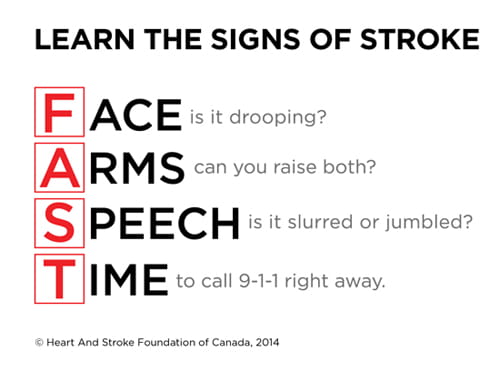Released on April 9, 2019
Stroke Campaign Urges Saskatchewan Residents to Recognize Signs and Act FAST (Face - is it Drooping; Arms - Can You Raise Both; Speech - is it Slurred or Jumbled; Time to Call 911)
The Government of Saskatchewan is providing funding in the 2019-20 Budget to the Heart & Stroke Foundation to boost their FAST public awareness campaign – allocating an additional $50,000 to get the FAST message out to Saskatchewan residents.
“We want people to be able to quickly identify the signs of a stroke and understand that receiving emergency care is critical,” Health Minister Jim Reiter said. “The Heart and Stroke Foundation has had great success with their FAST campaign, that is why our government has committed $50,000 in this year’s budget to support their good work.”
“Over the last decade, stroke care in Saskatchewan has improved, but incidences of stroke have increased,” Manitoba and Saskatchewan Heart and Stroke Foundation CEO Allison Kesler said. “It is more important than ever for people of all ages to know what a stroke looks like and how to get help. I commend the Government of Saskatchewan for this important investment that furthers their commitment to provide individuals with the best care and outcomes.”

Since 2014, the FAST campaign has successfully improved public recognition of stroke signs across Canada. The campaign also urges people to call 911 immediately if they - or the person they are with - are showing signs of a stroke. Calling 911 triggers a provincial “stroke alert”, which allows health care workers at stroke centres to prepare to treat a stroke when the patient arrives.
Stroke is a medical emergency and people experiencing a stroke should never drive themselves to the hospital. Patients arriving by ambulance receive more timely treatment than those driving themselves, and faster treatment lessens damage to the body – especially the brain.
A stroke happens when blood stops flowing to any part of your brain, damaging brain cells. The effects of a stroke depend on the part of the brain that was damaged and the amount of damage done.
Approximately 1,700 people are hospitalized for stroke every year in Saskatchewan, with about 300 of those cases resulting in death. Statistically, the majority of people who experience stroke and make it to the hospital have better prospects for survival and recovery today than they did even five years ago. These improvements have come as a result of research that shows outcomes are greatly improved when early signs of stroke are recognized and treatment is sought quickly.
For more information, visit www.heartandstroke.ca.
-30-
For more information, contact:
Shelley Svedahl
Health
Regina
Phone: 306-787-4083
Email: shelley.svedahl@health.gov.sk.ca
Annica Ramkissoon
Heart and Stroke Foundation
Phone: 204-799-7337
Email: annica.ramkissoon@heartandstroke.ca

